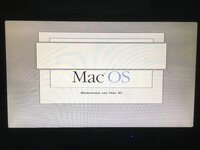zefrenchtoon
Well-known member
Hi everyone !
I saved from bin long time ago a 6100/66 Dos Compatible and since few weeks, I am trying to resurect it to have some fun with it.
First, I changed battery and installed a BlueSCSI to replace the faulty SCSI hdd on which I created two "drives" of 2GB each.
Second, I changed the Apple 300i CD drive by a Pioneer 303S DVD drive (I know that DVD is sort of useless in this kind of computer but it was taking dust in an old 7500 in my parents attic so …).
Then, I tried to instal some different versions of MacOS on it.
The goal is to get a 9.1 and a 7.6 with DOS card support to "play" with some DOS software.
As I have 40MB of RAM, I think It is ok to run almost what I want. Maybe I will try to find faster (and newer) RAM in the future but this is not my priority.
It did install 9.0 on one of my emulated disks and 7.6 on another one.
Now, the different problems I have are:

Thank you for your attention
I saved from bin long time ago a 6100/66 Dos Compatible and since few weeks, I am trying to resurect it to have some fun with it.
First, I changed battery and installed a BlueSCSI to replace the faulty SCSI hdd on which I created two "drives" of 2GB each.
Second, I changed the Apple 300i CD drive by a Pioneer 303S DVD drive (I know that DVD is sort of useless in this kind of computer but it was taking dust in an old 7500 in my parents attic so …).
Then, I tried to instal some different versions of MacOS on it.
The goal is to get a 9.1 and a 7.6 with DOS card support to "play" with some DOS software.
As I have 40MB of RAM, I think It is ok to run almost what I want. Maybe I will try to find faster (and newer) RAM in the future but this is not my priority.
It did install 9.0 on one of my emulated disks and 7.6 on another one.
Now, the different problems I have are:
- I could not install 7.5.3 from a genuine CD for an unknown reason.
- I am unable to update 9.0 to 9.1 using a genuine update CD.
- Booting from 9.0 is very slow …
- Finally, my 7.6 fresh install crash at startup (see attached "screenshot", and yes, it is a French 7.6 …).
Thank you for your attention

